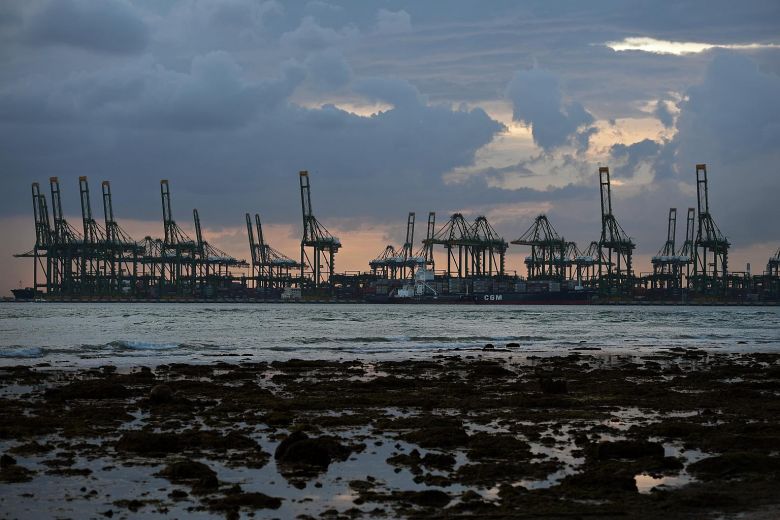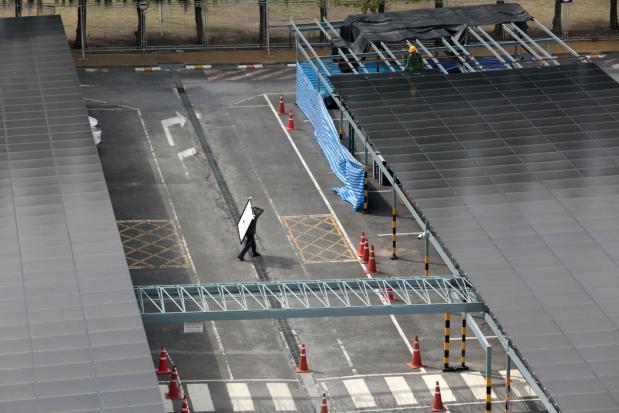IN JULY 2017, Frontier reported on the longstanding frustration among drivers in Myanmar at the poor quality of fuel sold at local stations. Just a few months earlier, the Myanmar Investment Commission had abolished a requirement that foreign investors in the sector partner with the Ministry of Energy and Electricity. The larger local players were already aligning with foreign partners. “The long fuel lines at the few private stations with a good reputation could soon be a thing of the past,” we wrote.
Almost two years later, though, there has been almost no perceptible change: few foreign brands, the same old complaints from drivers about price and quality. But a long-closed, profitable market has supposedly opened up, so why have investors mostly stayed away?
Although there is no single answer, it’s certainly not lack of interest. Back in mid-2017, Shell, Total, PTT and CNPC among others were all said to be in the middle of talks with potential partners.
It’s not hard to see the attraction. Myanmar imported US$2.7 billion of processed fuel last year, show figures from the International Trade Center, and in January 2017 BMI Research forecast consumption to grow at an average annual rate of 6.0 percent a year for the next decade.
“Everybody who is anybody in international fuel tanking, storage and retail has been negotiating,” says Mr Edwin Vanderbruggen of legal advisory firm VDB Loi.
Cooling off
Interest has cooled considerably since then, however, as the difficulties of closing a deal and making a profit become clear.
Shell and Max Energy, for example, signed a licensing agreement in July 2017 under which they targeted rolling out Shell-branded retail sites throughout the country over the following three years. “These sites will adhere to the highest standards in service, quality fuels and values of the Shell brand,” the companies said in a statement, adding that the stations would sell fuel supplied by Shell International Eastern Trading Company.
There has been little progress since then, however, with sources telling Frontier that the high standards set by Shell have been a sticking point because Max would be required to invest a prohibitive amount upgrading existing fuel stations.
“Max Energy Pte Ltd and Shell are still in close discussions to explore solutions on how to make the partnership sustainable for the long term,” a Shell spokesperson said.
Similarly, a proposed joint venture between French energy giant Total and Denko has not materialised, despite local media reporting that an application had been submitted to the MIC. Denko did not respond to a request for comment, while Total declined to comment.
Puma Energy Asia Sun, in which Singapore’s Puma Energy holds an 80 percent stake, was the first foreign investor in the sector, partnering with Myanma Petroleum Products Enterprise on a jet fuel joint venture and then developing a $92 million fuel terminal at Thilawa.
In May 2017, the MIC granted the company permission to broaden its existing investment permit to also include importing, distributing and selling petroleum products. Puma soon announced plans for up to 50 outlets within a decade, but so far none have open. It too declined to comment.
Finally, in late March, China’s CNPC became the first foreign firm to announce an investment in a Myanmar fuel retailer, when its subsidiary, Singapore Petroleum Company, teamed up with Shwe Taung Energy.
Shwe Taung Energy operates 15 stations in Yangon, Bago, Mandalay and Sagaing regions under the brand name “High Way”, according to company documents, and a flagship site at the corner of Pyay and Dhammazedi roads in Sanchaung Township was the first to get the SPC logo.
A spokesperson for Shwe Taung said the other stations would be progressively rebranded to SPC. Under the agreement, which is only for retail, the SPC outlets will sell fuel imported direct from the company’s Singapore terminal.
However, CNPC acquired only 35 percent of Shwe Taung Energy – the maximum possible under the Myanmar Companies Law for it to remain a local company. Shwe Taung declined to comment on the structure of the deal, with a spokesperson saying it was “confidential”.
SPC is part of Petrochina, a CNPC subsidiary that is the largest exporter of both diesel and gasoline to Myanmar, according to data from Refinitiv Oil Research & Forecast, with approximately 35 percent of the market.
Commenting on the deal, Refinitiv Oil Research director Mr Yaw Yan Chong said that typically a company like Petrochina would have bought a much larger stake in Shwe Taung Energy.
“If I’m Petrochina, I’m rich enough to buy the whole thing and then I would have complete control of it,” he said.
Refinitiv research shows that Singapore trading house Hin Leong is the next largest supplier of refined fuels to Myanmar, with around a 25pc share, followed by Gunvor, Vitol, Daewoo, Trafigura and PTT. Refinitiv estimates that Myanmar imports around 4 million metric tonnes a year from Singapore, including 2.5 million tonnes of diesel and 1.5 million of gasoline.
While the Myanmar market was small, Yaw said that “any of these top five guys would be happy to have retail outlets in Myanmar” because it would guarantee them a level of demand for their product.
Finding a way to enter the market, though, has proven difficult.

The SPC outlets will sell fuel imported direct from the company’s Singapore terminal. (Thuya Zaw | Frontier)
High land prices, local resistance
The importance of maintaining local company status is likely due to restrictions on foreign ownership of land. More broadly, land valuation and site acquisition have been among the key stumbling blocks for prospective foreign investors in both the retail fuel sector (known as downstream) and the import, storage and distribution business (referred to as midstream).
This is particularly the case in urban areas, where land prices are high. Frontier understands the proposed Denko-Total partnership, for example, fell through due to an inability to agree on the value of Denko’s existing stations.
Foreign investors, though, have little option but to work with existing players, most of which acquired their prized land holdings – fuel stations in urban areas and terminals at Thilawa – under the military regime.
While starting a new venture is possible under investment rules, it’s more of a challenge in practice. Acquiring greenfield sites would be expensive and require overcoming bureaucratic hurdles, such as changing the designated land use and getting consent from neighbouring property owners to open a fuel station. In Yangon, there’s an additional hurdle: since the National League for Democracy took office, the regional government has effectively banned new fuel stations from opening.
“The government has given land to local players, so the foreign companies need to partner with the local players to have access to land,” said Mr Jaume Marques, an advocacy officer for energy at EuroCham, the European Chamber of Commerce in Myanmar. “Another hindrance is the high expectations from the local companies when they are approached to collaborate in a joint venture.”
The high valuations that local companies put on themselves are to some extent a product of the fragmented market. When the junta privatised more than 250 fuel stations in 2010, it sold them to a wide range of companies. Many operators acquired just a handful of stations; relatively few are large enough to be potential partners for a multinational.
This only encouraged them to drive a harder bargain, Vanderbruggen said. “They were each confronted by five to 10 potential suitors,” he said. “They feel, this is great, we’re the prettiest girl at the prom, I can play hard to get, and so the conditions demanded by local developers were high.”
But he also pointed to a “gap in culture and expectations and transactional experience between the foreign investors and local developers”.
Specifically, some deals had fallen through because local partners changed their mind on the financial terms at the last minute. “Even though it hasn’t been signed yet so you can change your mind … you’re trying the patience. This is not how you do a transaction. Foreign investors will, after a few times of that, say, well I’ve had enough,” Vanderbruggen said.
Most Myanmar companies in the sector are likely to be happy with the status quo, government officials say. Daw Khin Khin Aye, an assistant secretary at Ministry of Electricity and Energy, said many of the smaller owners see foreign investment as a threat rather than an opportunity. “Most local retailers don’t like the idea of these massive foreign companies coming into the market … the local retailers think there’s no way they’d be able to compete,” she said.
Another assistant secretary, U Aung Kyaw Htoo, said local companies fought for years to keep foreign companies out of the midstream and downstream sectors.
When international companies began showing interest in investing in 2012, the government accepted the request from local companies to have more time to prepare for competition, he said.
In 2016, the MIC called a meeting with industry stakeholders, including the ministry, and raised the issue again. “As usual, all the local businesspersons objected,” he recalled. But the ministry decided to give the green light anyway, he said, because it was clear that it would benefit the country.
“Even though we’ve allowed it, there are still barriers for foreign companies, including land acquisition and infrastructure requirements,” he said. “And then they have to negotiate joint ventures with the existing crony groups.”
An unwelcome spectre
At the Terminal fuel station on the corner of Thanlyin Chin Kat and Yadanar roads in Yangon’s Thaketa Township, the rows of pumps are empty. Less than 500 metres down Yadanar Road, a Yangon Petrol station is doing brisk business. The reason is obvious: its fuel is about K50 a litre cheaper.
The fuel is sold at a discount because the Yangon Region government leased the land to Yangon Petrol, which is a private company, at a very cheap price – possibly 30 or 40 times lower than the market rate. As rival operators are blocked from opening new stations, Yangon Petrol has reportedly secured anywhere from six to 26 sites in Yangon since late 2018.
The regional government has defended the controversial arrangement with Yangon Petrol, saying its priority is ensuring customers have access to cheap fuel and that it would consider leasing land to other private companies.
In early 2018, Yangon Region Chief Minister U Phyo Min Thein also said his government wanted to build its own facilities so it could stockpile up to a year’s supply of fuel to insulate against sudden global price shifts.
Others within the government have expressed an interest in re-establishing state-owned midstream and downstream businesses. In 2015, Myanmar Petroleum Products Enterprise sought a partner for a joint venture to import, store and distribute fuel throughout the country, and nine companies submitted proposals.
Although the tender was quietly dropped in July 2017, the desire to get back into the business remains, said Khin Khin Aye from the Ministry of Electricity and Energy. Last May it was reported that MPPE might even issue another tender for a JV partner.
“We know that the government shouldn’t get back into the market,” Khin Khin Aye said. “But on the other hand we need more sources of income so we’re also looking at how we could enter this business through corporatisation.”
Marques from EuroCham Myanmar said the level of state intervention had made prospective investors wary. Efforts to control prices would put downward pressure on profit margins and had made the retail sector less attractive to investors, he said.
“While the government does not decide the final [fuel] price, the government influences the markets when trying to keep prices low,” Marques said.
As a result, European businesses are instead increasingly looking at opportunities in the midstream sector, where “they can compete through better standards including customer service and standard operating procedures”.
Here, too, they face familiar challenges, he said: limited land availability and high asking prices.

Tankers on the two-lane road that runs behind fuel terminals at Thilawa. (Thuya Zaw | Frontier)
Down at the port
It’s 5:30pm and the sun is beginning to set behind the fuel terminals along the riverfront at Thilawa in Yangon’s Thanlyin Township. Dozens of tankers wait in a parking bay beside the potholed two-lane road that runs behind the terminals. Drivers sleep with their feet out the window as they wait to fill up.
Nearly all of Myanmar’s imported fuel arrives at these terminals on tankers from Singapore. Retailers buy direct from traders abroad but typically do not have their own terminal or storage. Instead, they rent space from the handful of companies that have storage tanks, such as MMTM, Puma, Green Asia or Apex, and nominate a date when their fleet of tankers will come to collect it.
By international standards the facilities are modest and ripe for further investment. Several of the terminal plots lie empty, their local owners unable or unwilling to put in the money to develop them.
Vanderbruggen said Myanma Port Authority had leased these plots to Myanmar companies in around 2012, and the contracts require them to invest a minimum amount of money by a particular deadline. Most have already missed the deadline and lack the capital to build the facilities on their own, so they face the choice of taking on a foreign partner or risk MPA terminating the lease. This could push them to make a deal, he says.
“There is actually very little know-how on how to be a good fuel terminal operator … few companies that have these concessions have a track record,” he says. “We need to get down to business and I think we’ll see that.”
There has been some new development in recent years, however, with Puma’s 91,000 cubic metre terminal at Thilawa opening in May 2017. An undisclosed foreign company received permission from the Directorate of Investment and Company Administration in July 2018 to partner with Green Asia Services, a subsidiary of National Infrastructure Holdings, to build jetty facilities and storage tanks and distribute petroleum products.
Meanwhile, Denko, which is among the largest fuel distributors, has engaged TTCL Vietnam Corporation Limited to build a 135,000 cubic metre terminal under a $45 million engineering, procurement and construction contract, with work due for completion later this year. Kanbawza Group’s Brighter Energy is also believed to be planning a terminal, after receiving MIC approval for the import, storage, distribution and sale of LPG, gasoline and diesel in April 2018.
But these numbers are small in an industry where it’s normal for a single tanker to carry more than 1 million cubic metres of crude oil. The combined capacity of all tanks at Thilawa is still far below the 1.2 million cubic metres of storage capacity that CNPC has developed at Made Island in Rakhine State’s Kyaukphyu Township, where it unloads crude oil for transmission to Yunnan Province by pipeline.
And while the Kyaukphyu fuel jetty can accept tankers of up to 300,000 deadweight tonnes, according to the developer, those at Thilawa are lucky to accommodate a 15,000DWT tanker with a full load. Ultimately, the higher cost of shipping is past on to consumers.
“The smallest vessels used for this trade are 30,000DWT, so to ship to Thilawa the traders have to find an odd-shaped boat,” said Yaw from Refinitiv Oil Research. “The economy of scale is not good. So when anybody sells fuel into Myanmar, they sell it at a big premium – normally $5-10 a metric tonne.”
That could add anywhere from $20 million to $40 million a year to Myanmar’s refined fuel import bill, a sum that will only grow in the years ahead.
U Henry Zaw Tun, the CEO and managing director of Yangon-based electricity and energy firm Consultant International, said the allocation of the fuel jetties at Thilawa had been a “mistake” because it had not encouraged economies of scale.
The location of the jetties, small terminals and large number of players were problematic, he said. Meanwhile, the restrictions on foreign investment before 2017 had stopped the industry from developing because most local companies did not have access to the financing that would enable them to develop terminals on their own.
“To bring the cost [of shipping] down, I think government should consider dredging regularly the entire Yangon River. Of course, this will be quite costly but the return in terms of economic growth will much outweigh the expense of dredging,” Henry Zaw Tun said.
A loss for customers
Aung Kyaw Htoo from the Ministry of Electricity and Energy expresses frustration at the apparent stand-off between foreign and local firms. The biggest loser is the consumer, he says, who pays more for a product that is widely considered to be of poor quality.
“Everybody knows that there are doubts about the quality and the quantity of fuel being sold at filling stations,” he says.
Occasionally action is taken. Between September 2012 and April 2013, the government surveyed 131 stations in Yangon and Bago regions and found that 58 stations, or 44 percent, were not giving consumers the correct amount of fuel. When they checked a second time, the government team found four stations were still cheating their customers. A first offence results in a month-long closure, while those caught a second time are shut down for three months.
Aung Kyaw Htoo acknowledged that the ministry was supposed to monitor fuel quality and quantity at the stations, but said it often lacked the budget to conduct regular checks, which cost about K30,000 a station.
He said it plans to increase the number of checks, and pay particular attention to the quantity of fuel being dispensed.
It also intends to improve transparency and consumer choice by forcing stations to also display the supplier of their fuel. This means that instead of seeing just the logo of the retailer – Terminal, Denko or Max, for example – consumers will also see the name of the company that refined the fuel, such as PTT or Petronas.
“Today if you go to a fuel station, you won’t know how and what grade of fuel they’ve imported,” he said. “This system can help us introduce some real competition.” – Additional reporting by Kyaw Lin Htoon












